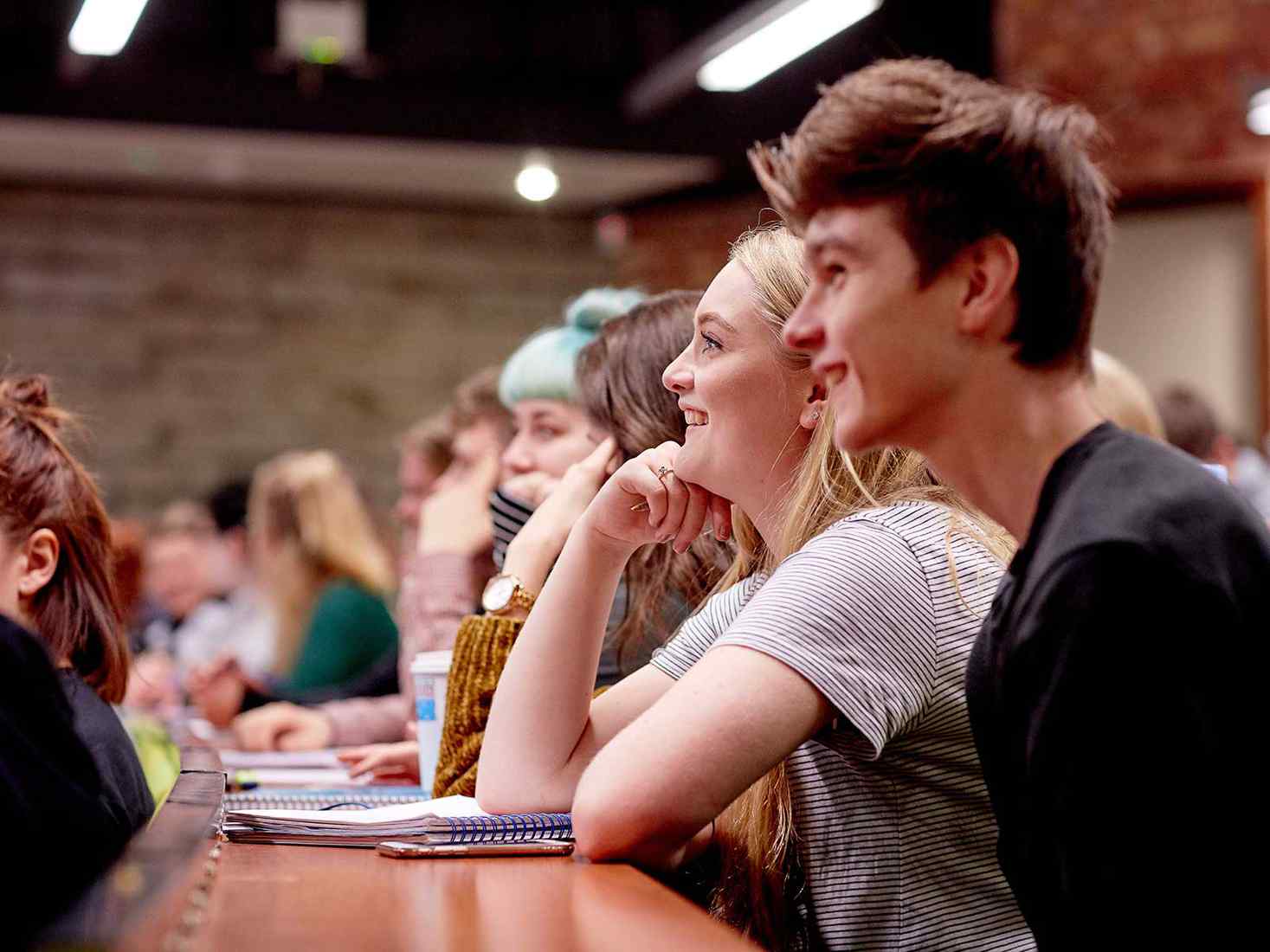Foundation Year
Law and Social Sciences Foundation Year
Explore the significant issues facing society today. Gain the skills and knowledge you need to succeed in your Law, Policing or Social Sciences degree.

Investigate theories, ideas and issues relating to law and society from many different perspectives. The topics you will cover on this foundation year are relevant to Criminology, Sociology, Law and Policing. The broad and varied understanding you will gain on this course will be a great asset as you move forward into your degree course.
York campus
- Duration – 1 year full time, then a 3 year full time or 6 year part time degree
- Start date – September 2024, September 2025
- School – York Business School
Minimum entry requirements
48 UCAS Tariff points
1 GCSE at grade C/4 (or equivalent) including English Language.
Tuition fees
UK 2024 entry £9,250 per year full time
International 2024 entry £14,000 per year full time
Course overview
This foundation year will introduce you to the study of law and social sciences at a higher level. It is a great opportunity to spend an extra year studying with us to make sure you are fully prepared to take on the challenge of higher education. You will study alongside students who intend to progress onto various different courses within these areas. This means you will have the chance to go beyond your chosen subject and explore the issues from a wider range of angles.
We will prepare you for degree level study by helping you develop essential academic skills. As well as learning about key aspects of Law and Social Sciences, you will learn to:
- Organise, plan and manage research projects
- Write in an academic style
- Present evidence and argument
- Engage in critical debate
These skills are valuable not only in your degree, but in your career after university.
This is the course for you if are excited about getting into higher education but do not want to dive straight into an undergraduate degree. This might be because you have been out of education for a while, you do not yet have the entry requirements for the course you want to do, or you just do not feel ready yet.
Law and Social Sciences degrees available with Foundation Year
Law with Foundation Year LLB (Hons)
UCAS Code: M101
MLaw with Foundation Year
UCAS Code: M201
Criminology with Foundation Year BA (Hons)
UCAS Code: L6L2
Criminology with Police Studies with Foundation Year BA (Hons)
UCAS Code: L3N3
Professional Policing with Foundation Year BA (Hons)
UCAS Code: L4L8
Sociology with Foundation Year BA (Hons)
UCAS Code: 8K8S
Sociology with Criminology with Foundation Year BA (Hons)
UCAS Code: LL34
Course structure
Year 1
Our academic year is split into 2 semesters. You will study:
- 3 compulsory modules in semester 1
- 3 compulsory modules in semester 2
Modules
Credits: 20
Compulsory module
On this module we will introduce you to the study of society by exploring the institutions and concepts that have shaped the world we live in. You will have the opportunity to engage with theories, approaches and ideas which will be fundamental to whichever degree course you intend to progress onto. The concepts we will introduce you to include:
- Capitalism and globalisation
- Law and the state
- Nationalism
- Racism
- Class and power
- Technology and post-industrial society
- Identity
Credits: 20
Compulsory module
This module will help you to prepare for studying at degree level by allowing you to develop your academic skills. Through this you will become familiar with academic conventions, as well as processes involved in devising, researching and writing your own projects. We will consider different approaches to research and explore various theories of knowledge. The skills we will help you to refine include:
- Referencing
- Effective reading
- Academic writing
- Communication and presentation skills
- Research skills
Credits: 20
Compulsory module
This module will introduce you to the processes behind the initial stages of criminal trials from legal and social sciences perspectives. Through this you will become familiar with key social science principles and develop important skills to take forward into your degree. This includes reading legal documents, evaluating sources, and practical problem solving. You will learn about some of the underlying structural issues which lie behind social, cultural, political and legal problems.
Credits: 20
Compulsory module
Through this module you will gain in in depth understanding of courts and sentencing. Alongside an exploration of the criminal justice system, you will learn about essential social science principles, such as:
- The rule of law and due process
- Ethics
- Professional conduct
- Victim and offender dynamics
You will further build on the skills you developed in the first semester, including assessing evidence and forming persuasive arguments. You will discover the wider contexts surrounding court process by analysing them from a range of social sciences perspectives.
Credits: 20
Compulsory module
On this module you will use the skills you developed in Semester 1, using relevant theories and concepts to investigate some of the social, cultural, political and legal issues facing us today. You will also consider media representations of issues such as youth crime, unemployment and social policy. We will challenge you to think critically about how these are presented and how this relates to academic research. This module will be based on current research from experts in both Law and Social Sciences, keeping the content as up to date as possible.
Credits: 20
Compulsory module
You will work with a live brief from a local third sector partner which identifies a problem they require a solution for. Work as part of a team, with the guidance of a project supervisor, and utilise the social scientific and legal knowledge that you have developed during your foundation year. Critically reflect upon your personal position and the ethical issues in your chosen area. This will help to prepare you for the more in depth research projects which will be an essential part of your degree.
Teaching and assessment
Teaching and learning
Your teaching will be made up of lectures, which include the whole year group together, and smaller workshops and seminars. Your learning will be supported by your Personal Academic Tutor, who will hold regular meetings with you to make sure you are on track to succeed.
We expect you to engage in independent study outside of your contact hours. This includes reading preparatory materials and completing activities on Moodle (our online learning environment).
Our teaching draws on both research and professional experience. This means your learning is informed by current thinking in the subject area. You can find out more about our research and backgrounds by visiting our staff pages.
Assessment
The assessments we use are designed to develop your skills. They are also intended to reflect the tasks and problems you will encounter when working in jobs related to these subjects. These may include:
- Essays
- Reports
- Portfolios
- Oral presentations
- Research projects
Within each module you will be given an opportunity to practice for your assessment, and receive feedback on practice work. This ensures that you are fully prepared and confident for final assessments.
Progression onto degree course
Passing all of the modules on this Foundation Year guarantees your progression onto either the Law LLB (Hons), Professional Policing BA (Hons) or one of our BA (Hons) degrees in Social Sciences. Your grades from this year will not be carried forward and will not count towards your final degree results.
Entry requirements
Qualifications
Minimum entry requirements
48 UCAS Tariff points
1 GCSE at grade C/4 (or equivalent) including English Language.
Calculate your UCAS Tariff points
International students
If you are an international student you will need to show that your qualifications match our entry requirements.
Information about international qualifications and entry requirements can be found on our International pages.
If English is not your first language you will need to show that you have English Language competence at IELTS level 6.0 (with no skill below 5.5) or equivalent.
Mature Learners Entry Scheme
If you have been out of education for 3 years or more and have a grade C GCSE in English Language or equivalent, you are eligible for our entry scheme for mature learners. It's a scheme that recognises non-traditional entry qualifications and experience for entry onto this course. Information on how to apply can be found on our dedicated page.
Terms and conditions
Our terms and conditions, policies and procedures contain important information about studying at York St John University. You can read them on our Admissions page.
Fees and funding
To study a Foundation Year with us, you will need to pay tuition fees for your course. How much you pay depends on whether you live inside the UK, or internationally (outside the UK). Tuition fees may be subject to inflation in future years.
UK 2024 entry
The tuition fee for 2024 entry onto this Foundation Year course is:
- £9,250 for your Foundation Year
- Then £9,250 per year of your undergraduate degree
This price applies to all UK, Jersey, Guernsey and Isle of Man students.
You can apply for the Tuition Fee and Maintenance Loan for the full duration of your course, including the Foundation Year and then your undergraduate degree.
You can find out more about funding your degree by visiting our funding opportunities page.
Tuition fees
UK 2024 entry £9,250 per year full time
International 2024 entry £14,000 per year full time
International 2024 entry
As an international student, the fee you pay for your foundation year will depend on the degree course you progress onto afterwards. £14,000 is the maximum amount you could pay. The international fee listed on your specific degree course is the fee you will pay for all 4 years.
This price applies to all students living outside the UK.
Due to immigration laws, if you are an international student on a Student Visa, you must study full time. For more information about visa requirements and short-term study visas, please visit the International Visa and Immigration pages.
Find out more about funding your degree.
Additional costs and financial support
There may also be some additional costs to take into account throughout your studies, including the cost of accommodation.
Course-related costs
While studying for your degree, there may be additional costs related to your course. This may include purchasing personal equipment and stationery, books and optional field trips.
Study Abroad
For more information on tuition fee reductions and additional costs for studying abroad, please visit our study abroad pages.
Accommodation and living costs
View our accommodation pages for detailed information on accommodation and living costs.
Financial help and support
Our Funding Advice team are here to help you with your finances throughout your degree. They offer a personal service that can help you with funding your studies and budgeting for living expenses.
For advice on everything from applying for scholarships to finding additional financial support email fundingadvice@yorksj.ac.uk.
Course highlights
Add more to your degree
Spend an extra year experiencing university life and refining your academic skills.
Your first step in Law or Social Sciences
You can join this foundation year without previous experience of studying Law or Social Sciences.
Go beyond your subject
Gain a broad understanding of the principles behind law, policing and social sciences to enhance your future learning.
Emily Law and Social Sciences Foundation Year
I decided to do a foundation year to help me as a stepping stone into university. As someone who didn't have much experience academically, I found the foundation course to be the best way to learn about university life and gain new skills to progress onto my chosen degree. The foundation year was a perfect balance of learning about university life and academia. It allowed me to increase my confidence in the degree I would go onto, and learn a wealth of knowledge to do with the course, which I still use in my degree now. Without the foundation year I would not be on a degree now, it was vital to my progression in academia and confidence for university.



.jpg)


